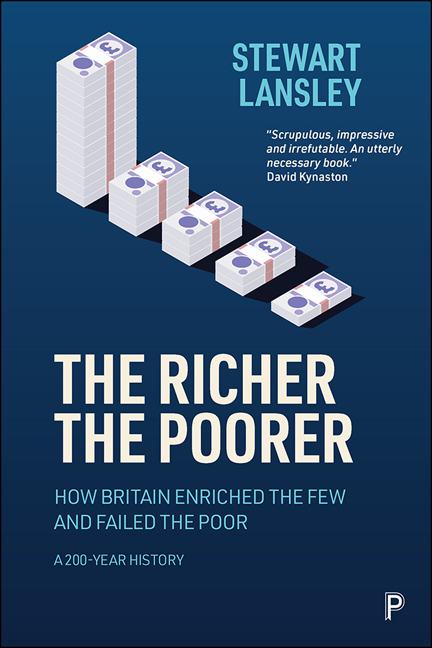Book contents
- Frontmatter
- Miscellaneous Frontmatter
- Dedication
- Epigraph
- Contents
- List of figures
- Preface and acknowledgements
- Introduction: Knighthoods for the rich, penalties for the poor
- PART I 1800–1939
- PART II 1940–59
- PART III 1960–79
- PART IV 1980–96
- PART V 1997–2010
- PART VI 2011–20
- Afterword: COVID-19 and ‘the polo season’
- Notes
- Index
3 - Public penury and private ostentation
Published online by Cambridge University Press: 13 May 2022
- Frontmatter
- Miscellaneous Frontmatter
- Dedication
- Epigraph
- Contents
- List of figures
- Preface and acknowledgements
- Introduction: Knighthoods for the rich, penalties for the poor
- PART I 1800–1939
- PART II 1940–59
- PART III 1960–79
- PART IV 1980–96
- PART V 1997–2010
- PART VI 2011–20
- Afterword: COVID-19 and ‘the polo season’
- Notes
- Index
Summary
The opening years of the new century brought growing unease about the social state of Britain. In 1903, the American writer Jack London –in The People of the Abyss – described the crushing poverty that he witnessed among the slum dwellers of Whitechapel as a ‘national sickness’. Raw capitalism and its innovative power may have helped make Britain, for a while, the world's leading industrial nation. But –it was now increasingly asked –were business leaders and landlords demanding too high a price from workers and tenants? In 1903, the American political activist and game designer, Elizabeth Magie, invented a board game she called The Landlord's Game. A forerunner of Monopoly, it was designed to show the consequences of the monopoly ownership of land and had two outcomes, one in which a single landlord secures all the land, and one in which it is equally shared.
Lowering poverty levels, reformers insisted, required the material gains from industrialisation to be shared more evenly through better wages and working conditions, an improved urban environment, an end to the inhumane Poor Law and more. Tackling poverty, wrote Seebohm Rowntree, involved ‘larger questions dealing with land tenure, with the relative duties and powers of the state and of the individual towards legislation affecting the aggregation and distribution of wealth’.
Clement Attlee, who became prime minister in 1945, had witnessed the dehumanising power of everyday life working as a volunteer in the East End of London, and was another early convert to the anti-inequality cause. ‘I soon began to realize the curse of casual labour. I got to know what slum landlords, and sweating, meant. I understood why the Poor Law was so hated.’ Along with Labour's early leaders, he was inspired by the vision of thinkers like Richard Tawney. His aim was to tackle ‘the exploitation of the mass of the people in the interests of a small rich class’, he declared in his electoral address as the Labour candidate for Limehouse in the 1922 general election. These were bold promises, but, despite the calls from some sections of the left that the solution lay in an intensified ‘class struggle’, Attlee aligned himself with the reformist wing of the growing Labour movement, one that rejected what he later called ‘vague utopian dreams’.
- Type
- Chapter
- Information
- The Richer, the PoorerHow Britain Enriched the Few and Failed the Poor: A 200-Year History, pp. 27 - 35Publisher: Bristol University PressPrint publication year: 2021



